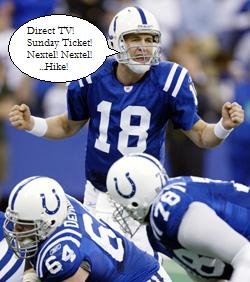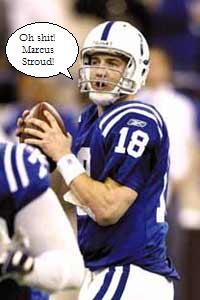Long. Nerdy. Fruitless.
>> Saturday
Scene:
An average Friday night, a slime-coated Milwaukee apartment, early spring 2006. A small group of genius soon-to-be bloggers is deeply immersed in conversation.
The topic at hand: the forthcoming 2006 baseball season. The future bloggers have touched on a wide range of topics, from the World Baseball Classic to Pedro Martinez’s trademark jerry curl. The conversation is passionate but civil, and dissention has been mostly innocuous.
But as the discussion steers toward championship predictions for 2006, one member of the group—a certain Matt “Zuch” Zuchowski—grows bold. Zuch, a White Sox fan still intoxicated from happy 2005 memories—and growing ever more intoxicated from his seventh Hamm’s and the rare species of mold living in the apartment—confidently predicts his Sox to repeat as champs.
Not only, Zuch says, would the White Sox win in 2006, but perhaps several more times in the near future. His reasoning in short: That Sox general manager Kenny Williams is an infallible, all-knowing handsome devil who--unlike Billy Beane or Brian Cashman since 2000--has a rare wisdom to build teams that are not only good but that are also ideal for winning in the playoffs.
Another member of the room, also named Matt, offers the most pronounced counterpoints to Zuch’s argument—foremost labeling Zuch a starry-eyed homer and “fucking crazy,” and further, challenging the very notion of a team “built to win in the playoffs”…But to little avail. Predictably, the discourse begins to break down as Matt implores Zuch to stick to college basketball analysis and to “leave the baseball to the adults.”
Insulted, Zuch rebuts with a defensive “Hey, fuck you, man” and accusations of blind deference to stat sheets and a Moneyball philosophy.
Not to be left out, Vinnie, the leading genius in the room, chimes in with a sprawling diatribe on Pythagorean win-loss records, impulse-response time, and standard deviations, which--like all of his sprawling diatribes--segues inexplicably into a sprawling moral lecture on resource conservation, the deterioration of communal values in modern society, and a general potpourri of pulpit-pulled poppycock.
Disgusted beyond his limits, the strongest member of the room, an Alaskan big-game hunter named Iain, cuts off the conversation and commands his friends to “shut the fuck up and let’s go to the bar you idiots before I kill all of you, Jesus Christ!”
Then everyone starts pelting each other with empty beer cans.
End scene.
So what, you ask, is the meaning of this rather typical glimpse into the pointless existence of us YCS contributors?
Simply, it provides a real-life illustration of an older-than-Jamie-Moyer debate among baseball fans that is particularly relevant at this time of season. Though it's a debate for which no resolution likely exists, every baseball fan, player, and expert seems to hold strong opinions.
So as October begins and the MLB playoffs grow imminent, we ask, “What, oh baseball gods in heaven above, determines which teams win in the playoffs?...Anything?...No?...Come on...there’s gotta be somethin’! I've got parlays to win!”
John Kruk: “A fun-loving group of veteran character guys will always have that extra edge (wink wink).”
Orel Hershiser: “It’s all about that ‘bulldog’ at the top of the rotation.”
Steve Phillips: “You need a general manager that’s not afraid to fail! How this relates to the playoffs, I don't know. I can't believe I ever even got there.”
Joe Morgan: “A key to success is a good manager—like Sparky Anderson. You also need great balance up and down the order. Davey Concepcion wasn't the greatest hitter, but when it counted…”
What, if anything, puts a good team at an advantage over another good, seemingly equal team? What causes a superior regular-season team to lose a short series against a reputedly lesser foe? Is there really a difference between a generic good team and the fabled team-that-wins-in-the-playoffs?
Jeff Brantley: “A playoff team has to have a guy who can shut them down in the ninth. Me, I had a 1.30 career WHIP and a horrendous mullet.”
Tim McCarver: [muddled nonsense muddled nonsense muddled nonsense] “…Bob Gibson back in the '68 World Series…” [muddled nonsense]
Rob Dibble: “You can’t be afraid to throw inside at a hitter—even if it means crackin’ a few skulls! Wait…what were we talking about?”
Tim Kirkjan: "Even I find my voice painfully annoying!"
I tend to believe that good teams are good teams. Strength in one particular area over another equally important area may, may give a team a very subtle advantage but certainly nothing to get hung up on.
But perhaps—in highly rare circumstance—I am wrong; perhaps the 2003 Florida Marlins with their 91 wins really had something that the 2001 Seattle Mariners and their 116 wins did not. Perhaps the Twins, with their “one big horse at the top of the rotation” are at advantage this year. Or maybe it’s the Yankees with their “proven stopper at the end of the game.” Or maybe—just maybe—Jim Leyland’s wrinkled brow and tar-stained moustache really will put the Tigers over the top this year.
So consider this Part One of my unintensive, unscientific, SportsCenter-caliber study challenging the notions of what gives teams the competitive edge in the playoffs. With this first installment, I chose to challenge the notion that excellent-hitting teams succeed in the regular season but fall to excellent-pitching teams in the playoffs.
For reasons I will likely explain in a later post, there are plenty of logical reasons to believe this conventional wisdom would prove true. But as always, we need to see if the numbers bear it out as well before buying into it.
While I would imagine someone has done a more thorough, methodically-superior study to answer this question, I ain’t-a found it. And this topic has been bugging me ever since that fateful and ludicrous argument one February eve. So I tried my best to at least give a simple answer.
My method to analyze this first premise is super -basic. Starting with 1981, I examined how each year’s World Series winner ranked in the league in OPS+ and ERA+. I chose these two metrics because A) they’re probably the most inclusive and simplest comparative measure of overall offense and pitching and B) they’re adjusted for ballpark and all that good stuff.
Why did I pick 1981? For starters, it was the final year that Steve Stone pitched in the majors—a true watershed mark for the league. More importantly, though, it provides an additional eight-team playoff year to bump that sample from eleven years to twelve. (I originally thought that would somehow prove relevant, but…uh, yeah, it didn’t.) Why didn’t I go back further than 1981, you ask? Simply—I’m too lazy. I’m too lazy, and also, these mean people make me go to something called “work” every day.
Having said that, 25 years (minus 1994 = 24 years) was probably too small a sample to work with. Ok...definitely too small. But since the numbers from these last 24 years turn out to be sort of interesting, I’ll share them and hopefully add to the sample when I have more time (or when SABR finally accepts my membership application).
So what do the numbers say?
Inconclusive! But more specifically:
-The average World Series winner ranked in the 67th percentile in OPS+, or only about 10th in a 30-team league.
Fun fact! The lowest in ranking was the ’05 White Sox (23rd), and the lowest by percentile was the ’85 Royals (20th out of 26 teams).
-The average World Series winner ranked in the 80th percentile in ERA+, or a shade better than 6th in a 30-team league.
Fun fact! The worst champ in both ranking and percentile was the ’87 "Homer Hanky" Twins (15th out of 26). They were also 19th in OPS+ but a clear 1st in luck.
-The average World Series loser would rank a tad better than 8th in OPS+ and about 7.4th-ish in ERA+.
So in case you’re a simpleton who can’t process numbers, that means the loser has, on average, hit better and pitched worse than the winner. But barely so. And although these disparities are small given the weak samples, they theoretically would support the conventional wisdom that good pitching overrides good offense in the playoffs.
Out of curiosity, I also took the average rank of World Series teams among playoff teams only in each of these two categories. I only used the years of ’95-’05 because averaging ranks among eight teams is flimsy enough, let alone among four teams. I also could have included ’81 but didn't because it was a total sham. And…
-The average World Series winner during the LDS era has ranked 5.4 out of 8 in OPS+ and 3.4 out of 8 in ERA+.
Three teams (’05 White Sox, ’99 Yankees, ’95 Braves) have won the World Series while ranking last among playoff teams in OPS+. The ’03 Marlins are the only World Series winner to rank last in ERA+ among playoff teams.
-The average World Series loser has ranked just about 4th exactly in both categories.
Agan—better at hitting the ball but slightly worse pitching it. And while these results seem to reinforce the trends from the league-wide data, they’re also really, really shaky. Too few years, too few outcomes. You can decide what they’re worth.
I also compared the regular-season records of World Series winners and losers to those of teams that led the league in each metric (excluding the strike-shortened years of 1981 and 1995). Wouldn'cha know; the comparison seems to support the other implication of our conventional wisdom—that is, offense wins out in the regular season but not necessarily in the playoffs.
Average win total for a World Series champ: 95.9
Average win total for a World Series loser: 96.3
Average win total for teams that led (or tied for the lead) in OPS+: 96.4
Average win total for teams that led (or tied for the lead) in ERA+: 92.6
Excluding that cursed 1981, of the twenty-seven teams that have led (or tied for the lead) in OPS+, only three (11%) won less than 90 games (the ’83 Brewers with 87, the ’96 Mariners with 85, and the ’84 Phillies with 81). Even the strike-shortened ’95 Indians (not included in the average for obvious reasons) won 100 in 144 games.
By contrast, of the twenty-seven teams that have led or tied for the ERA+ title, nine (33%) failed to win 90 games. Six of these teams had .500 records or worse (the ’88 Expos with 81, the ’82 Blue Jays with 78, the ’83 Rangers with 77, the ’84 Pirates with 75, the ’92 Red Sox with 73). Compare that to only one .500 team among OPS+ leaders.
I will say—that four-win disparity between OPS+ leaders and ERA+ leaders seems impossibly high and is (my guess) skewed a bunch by that ’82 to ’84 stretch, where the ERA+ leaders had a sub-.500 record each of those years. Just a hunch, but I can’t imagine that ever happened before ’82-’84, nor is it likely to happen again any time soon.
Now look at the playoff results for these top-dog teams.
In the twelve years of divisional playoff format (that retarded ’81 and ’95-’05), the OPS+ leaders (fourteen of them, including two years with a tie) fared as follows:
Won it all: 1 (’99 Yankees)
Lost the World Series: 3
Lost in the LCS: 1
Lost in the LDS: 5
Early tee time: 4
As for the thirteen teams that led or tied in ERA+ (only one tie, which confuses the comparison a bit), here’s how they finished:
All the marbles: 2 (’05 White Sox, ’95 Braves)
Their league’s marbles only: 2
Lost in the LCS: 5
Lost in the LDS: 1
No dice: 3
Only one more World Series winner than the OPS+ leaders but four more teams in that "lost in LDS" category. Interesting.
Here’s that same breakdown from the twelve other years (’82-’93).
OPS+ leaders (thirteen teams):
Won WS: 2 (’86 Mets, ’84 Tigers)
Lost WS: 3
Lost LCS: 4
No such thing as LDS: Right
Bummerville junction: 4
ERA+ leaders (fourteen teams):
Won WS: 2 (’86 Mets—they were good, ’89 A’s)
Lost WS: 2
Lost LCS: 5
Whamp-Wawmp: 5
Essentially no difference. Given the limited data, this breakdown is sorta pointless anyhow. Come to think of it, the old two-division system was crap, so screw it. Also, I’m out of hokey ways to say “missed playoffs.”
As kind of an aside, I was curious to look into a specific team outside of my scope—the ’73 Mets. Though they didn’t win the World Series, they made it there and took the A’s seven games before losing. I was specifically curious about that team because, as far as playoff teams go, they sucked pretty hardcore. They got into the playoffs by winning an absolutely ridiculous NL East race with only 82 wins.
But it turns out the ’73 Mets could pitch—111 ERA+ good for fourth in all of baseball and good enough to knock off the favored and OPS+-leading Reds 3-games-to-2 in the NLCS. (Take that, Joe Morgan!) The Reds, for all their offense that year, ranked just fifteenth in ERA+ that year. And guess where the Mets placed in OPS+ that year. Yep—dead last. In the entire MLB.
I know this is a cherry-picked single outcome, but it’s pretty interesting nonetheless.
So what could these numbers mean?
Likely nothing; possibly something. If the trends since ’81 prove true when extended further back in history, they would suggest pitching-strong teams have a slight edge over hitting strong teams in the playoffs. This conclusion, of course, would draw in the complicating factor of teams (effectively) shrinking their pitching staffs in the playoffs and the consequent limitations with comparing regular-season results.
But even if the conclusion holds true, remember that for any norm, each individual outcome is a deviation--especially for something as wildly unpredictable as the MLB playoffs. So it makes perfect sense that the 2003 Marlins could win the World Series with the statistically weakest pitching among the eight playoff teams that year.
I guess the only thing we can safely agree on is that good teams make the playoffs, and really good teams win the World Series…unless we’re talking about 1987, the year a dynamic young pizano named Gary “The Rat” Gaetti led a pack of untalented vermin to the biggest cheese-hunk of all in one of the most baffling playoff outcomes of recent history. So really, who the hell knows.
Maybe the best conclusion to draw is the one we all knew to begin with. MLB playoff series are crazy short given the length of the regular season, the wildly variant single-game scoring outcomes (compared to, say, basketball), the limited number of human performance outcomes that determine a baseball game, the amount of luck that plays into each of these outcomes, the disproportionate impact of a single player (starting pitcher), etc etc etc.
So essentially, the result of any individual playoff series is pretty random no matter how you dice it. And given all the data, I’m pretty confident we would only see (what most people would consider) very subtle advantages among playoff teams with given strengths and weaknesses.
But all of this does intrigue me enough to pop a few—how do they say?—“greenies” or “magic beans” and add in the years ’69 through’80 to this OPS+/ERA+ comparison to round out the rest of the LCS era. And even though it would be a waste of my time, I’d also like to examine these other popular beliefs:
-More experienced teams win in the playoffs.
-A team needs an exceptional bullpen to win in the playoffs.
-Teams that rely on dingers don’t win in the playoffs.
-Teams with a dominant ace have a significant advantage in the playoffs.
For now, that’ll all have to wait for my next installment of “Snore Time with Dr. Snooze,” which I figure will never actually occur. In fact, I hope it doesn't for all of your sake. But that was pretty cool how I acted like this would be a multi-part thing but totally lied, huh? Who knows, though; maybe by next year's playoffs, I'll get a hankerin’ for playing around in Excel again. But I doubt it.
So hopefully I wasted a lot of your time. And what a shame--I'm too far to nail with a beer can! Maybe next time I'll write about resource conservation. Or shake my dick.
(Suckers.)
Wow--unnecessarily long set-up, Jamie Moyer cheap shot, heavy emphasis on stats--I think I smell that first Pulitzer, guys! And by the way, now you all know my shameful secret. Those late nights at college I spent whoopin’ it up and doin’ two chicks at once? Yeah, that was just a put-on. The whole time I secretly longed to be on baseballreference.com looking up the ’73 Mets pitching stats. Sad but true (all of it--especially the two chicks part).
Read more...


































